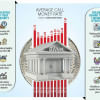Call money rate hits 12-year high

The interest rate on interbank loans crossed 9.5 percent today, the first time since 2012, in the face of rising liquidity shortage in the banking sector.
On January 23, banks borrowed Tk 2,476 crore from their counterparts at an average interest of 9.57 percent calculated on overnight basis as demand for money from cash-strapped banks and the government exceeded supply, data released by the Bangladesh Bank (BB) showed.
Bankers linked the liquidity dearth to the BB's sale of US dollar to banks and a rise in policy rate, which the banking watchdog has been pursuing in its effort to curb inflation by reducing excess demand in the market through making money costlier.
Last week, the BB hiked the policy rate--at which it lends to banks and financial institutions--by 25 basis points to 8 percent, posting the eighth straight spike in the rate since the tightening cycle began in May 2022, as inflation shows no signs of cooling.
As the policy rate goes up, it is natural for the fund to become costlier and it becomes evident from the auction of bond and treasury bills by the government, said a senior official of a private bank.
Banks that have surplus funds are showing interest to invest either in government treasury bills or going for interbank deposits to get higher returns, the official said.
"This is pushing up the interest rate on overnight loans. Government borrowing is a big factor here."
The banker said the yield of 20-year Bangladesh government bond auctioned today rose to 12.1 percent from 11.2 percent a month ago.
The yield or interest rate of 15-year Bangladesh government bond shot up to 12 percent at auction today from 11.1 percent a month before, the official added.
The liquidity flow squeezed further amid BBs' sale of dollars to banks to enable them to clear import payments.
Between July-December of 2023, the BB sold $5.69 billion of foreign currency to banks meaning that the central bank withdrew more than Tk 62,500 crore from banks.
"The market is not suffering for liquidity dearth from today. The availability of funds has started to reduce when the central bank started selling dollars to banks," said a chief of treasury at another private bank.
He said the new interest rate for overnight loans indicates that there is acute shortage of funds in the market.
"And the rate would have risen further had the central bank not provided support to banks through repo," he added.
However, the interest rate hike on overnight loans is nothing unusual.

 For all latest news, follow The Daily Star's Google News channel.
For all latest news, follow The Daily Star's Google News channel. 






Comments